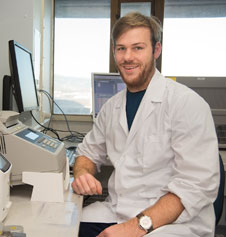
 George Wiggins
George Wiggins
Skiing, socialising with work mates, and great research opportunities are all reasons George Wiggins recommends postgraduate study at the University of Otago, Christchurch.
George is undertaking a PhD with the Mackenzie Cancer Research Group. He is being supervised by cancer geneticist Dr Logan Walker.
George's project involves gaining a better understanding of familial breast cancer and why the BRAC1 and BRAC2 genetic variations affect breast and ovarian tissue but not other tissues.
After doing a Masters at the University of Otago, George spent a year skiing in Canada before moving to Christchurch with his wife, whose family live there.
Studying at the Christchurch campus appeals to George because its proximity to Christchurch Hospital means a wealth of medical research opportunities. It is also the base of the Cancer Society tissue bank. Living in Canterbury appeals because the region offers myriad recreational activities.
When he's not working towards his PhD, George is skiing on many of the excellent fields in Canterbury and nearby regions, or playing rugby with a small rural club.
“The lab group (Mackenzie Cancer Research Group) is really good. I spend a lot of time outside of work with people from the group. If you can work with them and socialise with them, it's a really good sign.”
George's undergraduate and Masters study set him up for postgraduate study on the Christchurch campus, which is one of the country's best medical research centres.
He worked for two years with Professor Parry Guilford's cancer research group in Dunedin. During this time the Dunedin team investigated a genetic marker they hoped would predicts which people will react very badly to chemotherapy, with symptoms such as vomiting, dehydration and diahorrea.